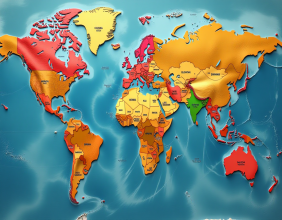Summary
- Sir Roger De Haan, the former top official is likely to invest £100 million and return as Chairman at the holiday provider
- The company has sold non-essential assets to shore up its finances and has also piled on some debt
- In the short-term, the Company plans to reduce leverage and preserve cash. It will continue the progress in Insurance business while maintaining a tight focus on cost and efficiency
The former top official of the holiday operator, Saga Group is planning to invest £100 million into the business while also making a comeback as the Chairman of the company.
As part of efforts to restore its fortunes, Saga Group is anticipating a fundraise of around £150 million through equity shares, out of which a major chunk would be bought by Sir Roger De Haan, followed by other investors. Sir Roger is most likely to take a 20 per cent stake while replacing Patrick O’Sullivan as its non-executive chairman.
The aspiring Chairman is expected to serve for an expected term of three years. While writing on 1 September 2020 at GMT 12:02 PM+1, SAGA shares were trading at GBX 16.90, up by a whopping 24.17 per cent in comparison to the previous closing price. However, Sir Roger will buy an initial tranche of shares at 27 pence each (almost double the closing price of 13.6 pence on 28 August 2020) of up to £60.6 million.
The former boss is most likely to invest up to £24.5 million provided there is significant demand from other investors. He has expressed huge faith in the company’s brand and business operations. The Travel & Leisure company believes that the fundraising would restore the lost value to the shareholders and would help the group in attaining sustainable growth. The company has sold non-essential assets to shore up its finances and has also piled on some debt. Due to the onslaught of the novel coronavirus, Saga Group was forced to bring 3,000 customers back to Britain and further suspend its cruise operations.
FTSE All-Share group, Saga Plc (LON:SAGA) provides products and services related to general insurance, personal finance, package, and cruise holidays. The company has a diversified business model which underpins resilience and can sustain for a longer period of time. In a bid to improve its liquidity further, the company successfully completed the disposal of Bennetts Motorcycling Services Limited to Atlanta Investment holdings C Limited, for the net disposal proceeds of around £23 million.
According to an update released on 22 June 2020, the trading performance during the period for Insurance business remained resilient, and it continued to make progress driven by three-year fixed-price policies. However, the travel business remained on pause due to Covid-19 restrictions since mid-March. In Healthcare division, the Company announced the disposal of two domiciliary healthcare companies - Country Cousins and Patricia Whites.
As of 31 May 2020, SAGA’s liquidity position stayed strong, though its total cash reduced by £62 million, though it was having undrawn £50 million of revolving credit facility (RCF). For a debt holiday and covenant waiver, it had signed an amortisation agreement, for the deferral of £32 million principal payments (which were due up to 31 March 2021).
In the short-term, the Company plans to reduce leverage and preserve cash. It will continue the progress in Insurance business while maintaining a tight focus on cost and efficiency. According to the recent trading update, the company had delivered £15 million of run-rate cost savings during Feb-June period. Moreover, it has entered FY21 with improved cash flows and lesser debt. The Insurance business has been performing strongly even during the COVID-19 mayhem. Overall, the business is resilient due to the diversified business model and differentiated product portfolio. The financial guidance remained uncertain; however, the Company is confident that Insurance and Travel businesses have a successful future ahead, against the backdrop of Covid-19.
Saga Plc -Stock Metrics
|
|
CMP (GBX) before market close as on 1 September 2020 at GMT 12:02 PM+ 1 |
Market Capitalisation (£ million) |
52 weeks High (GBX) |
52 weeks Low (GBX) |
1 Year Return |
|
Saga Plc |
16.9 |
152.7 |
59 |
13.32 |
-67% |
The plight of the cruise industry amid the pandemic
The travel sector has been among the worst-hit sectors during this unprecedented crisis induced by the novel coronavirus. As the nations across the globe underwent lockdown, travel restrictions were imposed to contain the spread of the deadly virus. The travel industry had never ever imagined such a scenario. The sector witnessed major job redundancies across segments of airlines, cruises, and other dependent sectors such as hospitality. The sector is under immense pressure from refund seeking customers.
The sudden drop in confidence of the travellers has brought many related businesses on the verge of collapse, and many are likely to go into administration. Major cruise ships such as Carnival plc were making headlines as travellers got infected with the deadly virus while travelling. Industry experts strongly believe that the holiday business would take a lot longer time to recover from the devastation caused by the novel coronavirus.
A luxury British cruise line owned by Carnival Plc (LON:CCL); Cunard has reportedly extended its pause of operations from November 2020. The voyages planned by the company are postponed until March 2021. Moreover, these voyages would be replaced with a programme of shorter duration European holidays for about two weeks commencing March 2021. Cruise line, P&O Cruises owned by Carnival Plc would not commence operations until next year due to the pandemic.
It is also being said that Carnival Plc has lost a lot of market capitalisation since the start of the year, which could result in its exclusion from the London’s broader equity benchmark index, FTSE 100.
Notably, the holiday providers are now leaving no stone unturned to infuse confidence in panic-stricken travellers. Carnival owned Italian company; Costa has introduced Covid-19 tests for its guests. It became the first cruise company to obtain certification of the biological risk prevention system known as RINA Biosafety Trust Certification. Axing jobs and other cost reduction measures have become a common phenomenon across the industry. The outlook for the already battered Travel & Tourism sector still not looking recovering in the near term.





